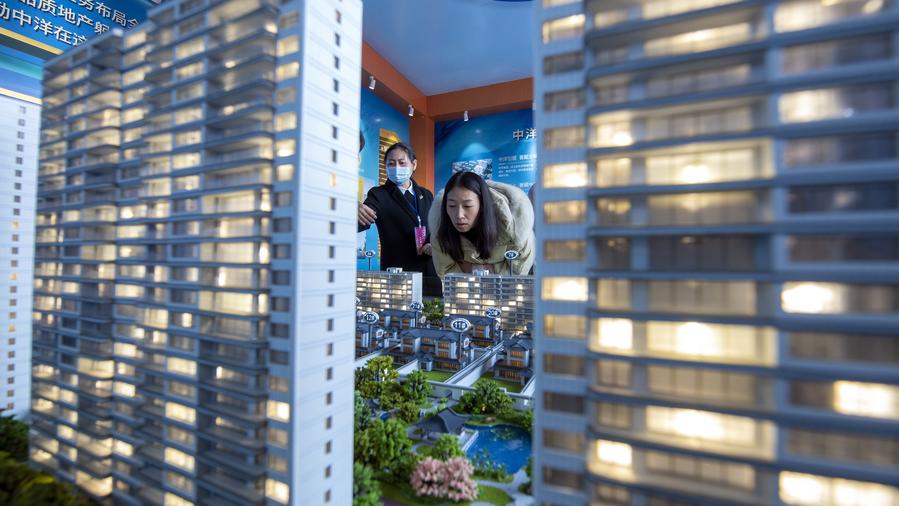 A potential homebuyer looks at a property model during an expo in Hai'an, Jiangsu province. (XU JINGBAI / FOR CHINA DAILY)
A potential homebuyer looks at a property model during an expo in Hai'an, Jiangsu province. (XU JINGBAI / FOR CHINA DAILY)
Official December data showed that China's home market remained largely stable, with home prices in major cities edging down slightly month-on-month.
The 70 big and medium-sized Chinese cities reported slower growth in their new and existing home prices compared with a year earlier, while their home prices saw a slight fall month-on-month, extending the downward trend seen since the beginning of the fourth quarter of last year, said Sheng Guoqing, chief statistician with the National Bureau of Statistics' urban division.
Ning Jizhe, head of the NBS, said data showed China's real estate market was generally stable in 2021, as the sector strictly abided by the guideline of "housing is for living in, not for speculation", actively executed the long-term mechanism for the property sector, and eliminated activities of taking real estate as a short-term stimulus tool for boosting the economy.
This helped stabilize land and home prices along with market expectations, besides actively preventing potential risks.
"As the property regulations are being rolled out, real estate developers will see more steady development, and the sector is heading in the development direction of intensive, high-efficiency, long-term, healthy and stable growth," said Ning.
He also said the consistent improvement in the long-term functioning pattern of real estate and the effect of city-specific measures will ensure China's property market will see a stable performance this year.
New home prices in the 70 major cities rose 2 percent year-on-year in December, but dipped 0.3 percent from November, according to NBS data.
Among them, the four top-tier cities saw their average new home prices edge down 0.1 percent from the previous month with price movements diverging. For instance, Shanghai reported a marginal increase of 0.4 percent in trading prices while home prices in Beijing were unchanged, while Guangzhou and Shenzhen in the southern Guangdong province, slid 0.6 percent and 0.1 percent, respectively.
Compared with prices a year earlier, the benchmark cities' new home prices grew at a slower pace of 4.4 percent.
New home prices in 31 second-tier cities tracked by the NBS slid 0.3 percent on average month-on-month in December. And their average prices grew 2.8 percent compared to the previous year. Among the 35 third-tier cities, the two figures were negative 0.3 percent and positive 0.9 percent, respectively.
The price trend in the pre-owned homes segment was similar to that of the new homes sector. The 70 cities' existing home prices edged down 0.4 percent month-on-month in December, but grew 1 percent year-on-year.
The four first-tier cities reported home prices in the secondary market rose 0.1 percent in December from the previous month.
They also reported a 5.3 percent year-on-year growth on average in existing home prices.
Investment in property development across China rose 4.4 percent year-on-year to reach 14.76 trillion yuan ($2.32 trillion) in 2021, NBS data published on Monday showed.
Compared with that of 2019, China's property investment rose 11.7 percent, with investment in the residential sector rising 6.4 percent to 11.12 trillion yuan.
Last year's data proved the resilience of China's property market, and the continuation of urbanization will ensure home transactions stay upbeat with positive growth, said Yan Yuejin, director of the Shanghai-based E-house China Research and Development Institution.
He suggested that with more demand in the pipeline, the current uptrend will likely continue.
Following its overall cooling in the second half of 2021, the real estate sector is likely to see some growth divergence this year from region to region, amid the pursuit of structural improvement and higher quality, said Ni Pengfei from the Chinese Academy of Social Sciences.
Growth in first and second-tier cities may pick up quickly, and in some areas, the possibility of overheating cannot be ruled out, while in the third- and fourth-tier cities and other smaller areas, the sector may continue to cool down, Ni said at a forum on Monday organized by China News Service.
Liu Zhihua in Beijing contributed to this story.


